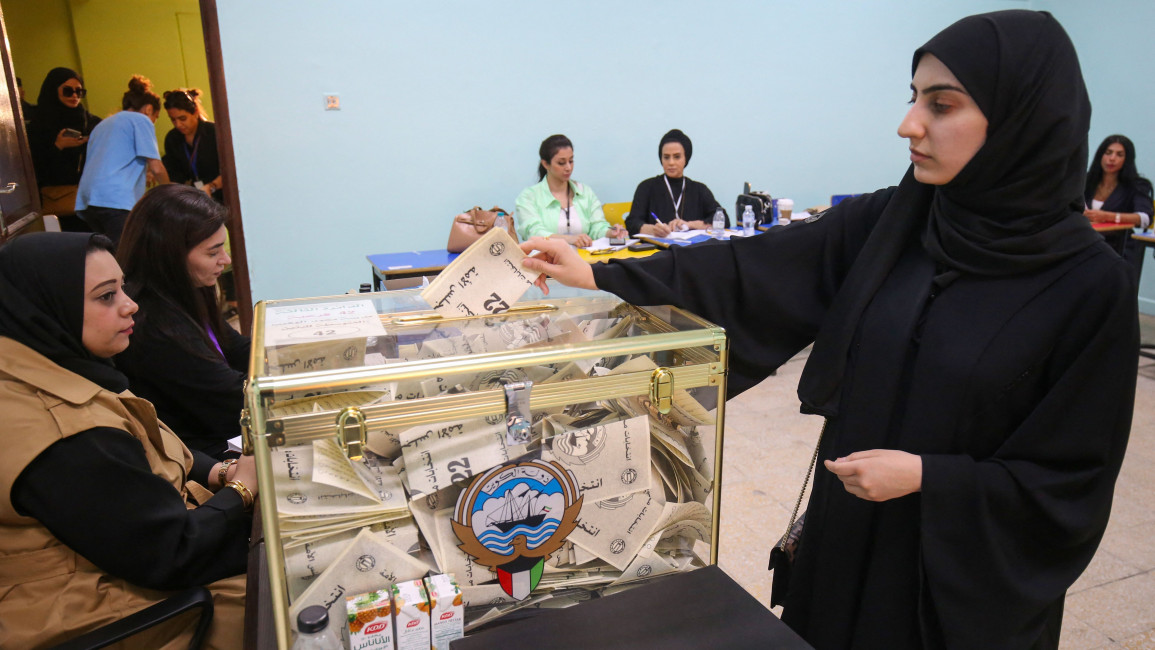Kuwaiti opposition wins big in election, standoff with government to endure
Opposition candidates, including Islamists, made considerable gains in Kuwait's parliamentary election, raising pressure on the government which was hoping to ease tensions with the elected legislature and press on with economic reforms.
Official results, published by state news agency KUNA on Friday, showed that most of the so-called "pro-government lawmakers" lost their districts while the Shia bloc added more seats. The Islamic Constitutional Movement, the Kuwaiti branch of the Muslim Brotherhood, also consolidated its share in the 50-seat assembly.
Two women were elected, marking their return to the parliament in the US-allied country and OPEC oil producer. Local media said 305 candidates, including 22 women, competed in Thursday's election that was organised after the Gulf state's crown prince dissolved the previous parliament in a bid to end a political standoff between the government and the legislature.
Prince Sheikh Meshal al-Ahmad al-Sabah made the move in August following a protest held by more than 20 MPs inside parliament pressing him to appoint a new government.
The deadlock with the cabinet has delayed the approval of a state budget for the fiscal year 2022/2023 and other economic reforms. The budget, which has to be voted on before November, had set spending at 23.65 billion dinars ($77.2 billion) compared with 23.48 billion for the 2021/2022 budget.
Political analyst Naser al-Abdali said the sweeping victory for the Islamist movements in these elections will have a great impact in the next National Assembly.
The political standoff will not stop with these results -- it will rather continue within the assembly, inside the ruling family as well as in the public debate, he added.
The results cast a doubt on the government's ability to pass sensitive economic reforms such as introducing a value-added tax (VAT), part of a regional agreement within the Gulf Cooperation Council. So far Kuwait and Qatar have resisted the move.
Political stability in Kuwait has traditionally depended on cooperation between the government and parliament, the Gulf region's most lively legislature. Kuwait bans political parties but has given its legislature more influence than in other Gulf monarchies.
Stalemates between Kuwait's government and parliament have often led to cabinet reshuffles and dissolutions of the legislature over the decades, hampering investment and reforms.
"The joy is real and not only in our headquarters but in all across the first constituency for the arrival of this large number of reformist MPs (to the parliament)," said Oussama al-Shaheen, a lawmaker from the Islamic Constitutional Movement who won back his seat for the fourth time in a row.
(Reuters)

![At least 87 were killed in an Israeli air strike on Beit Lahia in north Gaza [Getty]](/sites/default/files/styles/image_684x385/public/2178754081.jpeg?h=a5f2f23a&itok=rWbrlpHd)
![Trump promised that Lebanese people will be "happy" in the end, in comments made in a rally in Michigan [Getty]](/sites/default/files/styles/image_684x385/public/2112640005.jpeg?h=a5f2f23a&itok=P91hgdKY)


 Follow the Middle East's top stories in English at The New Arab on Google News
Follow the Middle East's top stories in English at The New Arab on Google News
![Blinken heads to Israel [Getty]](/sites/default/files/styles/image_330x185/public/2179125652.jpeg?h=a5f2f23a&itok=qddhTzNd)
![Ambulance near the struck Rafik Hariri government hospital [Getty]](/sites/default/files/styles/image_330x185/public/2179173250.jpeg?h=a5f2f23a&itok=aZ7tkRsO)
![Protest commemorating Sinwar and Haniyeh [Getty]](/sites/default/files/styles/image_330x185/public/2179413541.jpeg?h=a5f2f23a&itok=SSYDHhev)